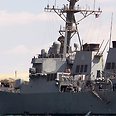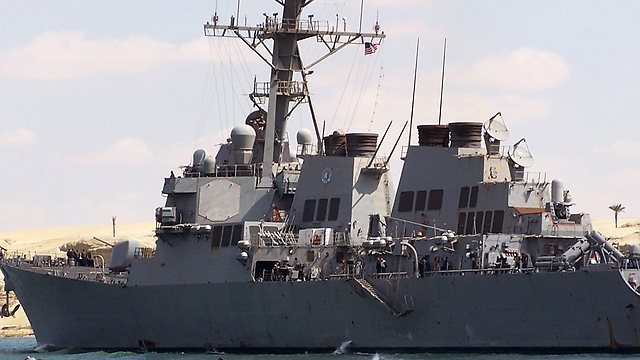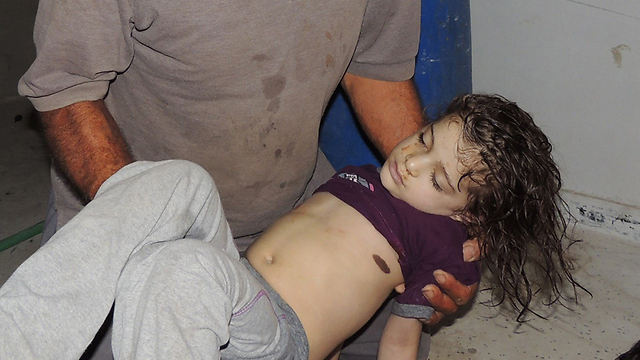
US on Syrian intervention: We have a range of options available
US President will meet his national security team Saturday. Meanwhile, top military commanders from US, Saudi Arabia, Turkey, Britain, Qatar, France, Germany, more will meet in near future at Jordan's invitation to discuss response to Syrian massacre
President Barack Obama was to meet with his national security advisers early on Saturday to discuss reports that the Syrian government used chemical weapons this week in an attack on a Damascus suburb, a White House official said in a statement.
Meanwhile, military commanders from Western and Muslim countries are to meet in Jordan to discuss the impact of the Syria conflict, a Jordanian official said in remarks published on Saturday.
Related stories:
- US forces move closer to Syria as options weighed
- Obama concerned by Syria, but cautious of costs
- Initial Western intelligence finds chem usage
"As we have previously stated, the President has directed the intelligence community to gather facts and evidence so that we can determine what occurred in Syria. Once we ascertain the facts, the President will make an informed decision about how to respond," the official said regarding Obama's meeting.
"We have a range of options available, and we are going to act very deliberately so that we're making decisions consistent with our national interest as well as our assessment of what can advance our objectives in Syria," the White House official said.

US destroyers near Syria (Photo: AFP)
In regards to the meeting of top generals from both Arab and Western nations, an unidentified official from Jordan's high command said the meeting is to take place in the coming days at the invitation of Jordan's chief of staff Meshaal Mohamed al-Zaban and General Lloyd Austin, head of Centcom, the US command responsible for 20 countries in the Middle East and Central Asia.
America's top military officer General Martin Dempsey will take part, as well as chiefs of staff from Saudi Arabia, Qatar, Turkey, Britain, France, Germany, Italy and Canada, said the official, cited by state news agency Petra.
The official said the meeting would be an opportunity to "examine the questions linked to the security of the region and the repercussions of the Syrian crisis, as well as means of military cooperation to assure the security of Jordan".
The announcement came as the United Nations disarmament chief arrived in Damascus in a bid to press the Syrian government to allow UN experts to investigate an alleged chemical weapons attack this week. Angela Kane did not speak to reporters upon her arrival on Saturday in the Syrian capital.
The international community has called for a UN investigation into the alleged use of chemical weapons in the war in Syria, which European countries and opponents of President Bashar Assad have blamed on the regime.
Photos from the massacre (Photo: Reuters)
Syria's main opposition group, the National Coalition, accused the government of "massacring" more than 1,300 people in chemical weapons attacks on Wednesday.
US Defense Secretary Chuck Hagel suggested on Friday that the Pentagon was moving forces into place ahead of possible military action against Syria, after Russia dismissed calls for use of force against its ally.
Last week, General Dempsey discussed ways to help the Jordanian military tackle fallout from the Syria conflict, including border surveillance, intelligence and training Jordan's special forces.
Fearing the conflict could spill over into Jordan, the United States has deployed F-16 fighters and Patriot missile defenses, along with about 1,000 US troops, to protect its close Arab ally, a major beneficiary of US aid.
Iran confirms
Earlier Saturday, Iranian President Hassan Rohani acknowledged for the first time chemical weapons had killed people in ally Syria and called for the international community to prevent their use.
Children allegedly killed in chemical attack (Photo: Reuters)
Rohani stopped short of saying who had used the arms - Tehran has previously accused Syrian rebels of being behind what it called suspected chemical attacks.
"Many of the innocent people of Syria have been injured and martyred by chemical agents and this is unfortunate," recently elected Rohani was quoted as saying by the ISNA news agency.
"We completely and strongly condemn the use of chemical weapons," he said, according to the agency.
"The Islamic Republic gives notice to the international community to use all its might to prevent the use of these weapons anywhere in the world, especially in Syria," he added, according to the Mehr news agency.
(Photo: Reuters)
(Photo: Reuters)
Iran's foreign minister earlier this week said groups fighting Syrian president Bashar Assad must have been behind what he then said was just a suspected attack.
Russia, another major ally in the Syrian government, has also blamed opposition forces.
Kosovo-Damascus
US officials are looking at the air war over Kosovo in the late 1990s as a possible blueprint for strikes on Syria without a UN mandate, the New York Times reported Saturday.
During the 1998-1999 conflict, Russia supported the Yugoslav regime of Slobodan Milosevic, accused of committing atrocities against civilians in Kosovo. But since Russia holds veto power in the UN Security Council, there was no chance of getting a resolution authorizing the use of force against the Yugoslav Republic.
In March 1999 NATO launched a series of air strikes against Yugoslav forces, arguing that it was the abuses that constituted a grave humanitarian emergency. The attacks lasted 78 days.
One year after warning that the use of chemical arms in the Syrian conflict would cross a US "red line," the administration of President Barack Obama is searching for ways to respond to Basher al-Assad's regime if its use of the banned weapon is proven.
Today, as in the late 1990s, Russia opposes a Security Council resolution authorizing the use of force against Syria.
"It's a step too far to say we're drawing up legal justifications for an action, given that the president hasn't made a decision," an unnamed senior administration official told The Times, speaking on condition of anonymity.
"But Kosovo, of course, is a precedent of something that is perhaps similar," the official said.
- Receive Ynetnews updates directly to your desktop











